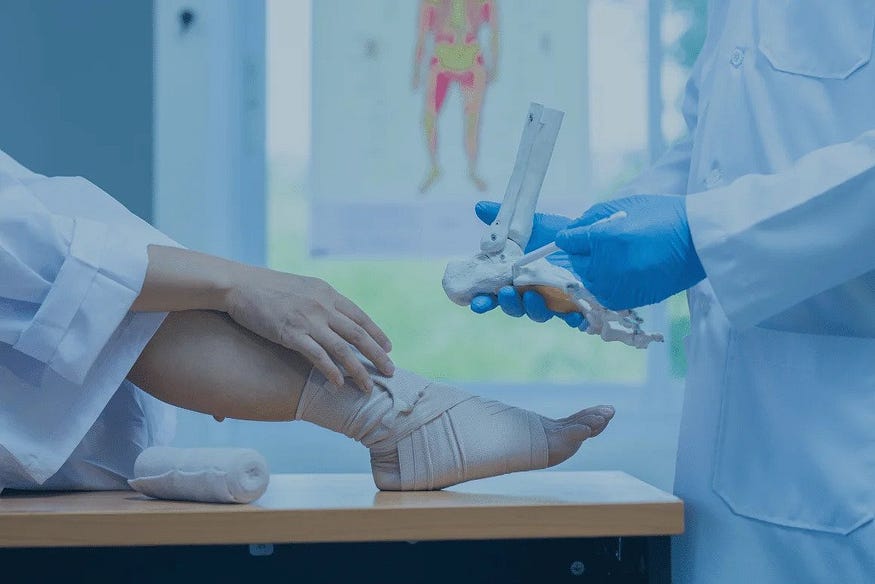
HOW ORTHOPAEDIC DOCTORS HELP YOU RELIEVE & MANAGE PAIN
Orthopaedic doctors are specialized physicians who focus on diagnosing, treating, and preventing musculoskeletal conditions and injuries. They play a crucial role in helping individuals of all ages relieve and manage pain related to the bones, muscles, ligaments, tendons, and joints. Whether you are dealing with a sports injury, chronic pain, or age-related conditions, orthopaedic doctors offer comprehensive care to improve your mobility and quality of life. In this blog, we will explore how orthopaedic doctors can assist you in relieving and managing pain effectively. If you are experiencing musculoskeletal pain or seeking relief from orthopaedic conditions, seek expert care and comprehensive treatment at Specialty Care Clinics.
Accurate Diagnosis:
The first step in pain relief and management is an accurate diagnosis. Orthopaedic doctors are highly trained in evaluating and diagnosing a wide range of musculoskeletal conditions. They conduct thorough physical examinations, review medical history, and use imaging tests such as X-rays, MRI, or CT scans to identify the root cause of your pain. With a precise diagnosis, they can develop a targeted treatment plan tailored to your specific needs.
Non-Surgical Treatments:
Orthopaedic doctors emphasize conservative, non-surgical treatments whenever possible. They may recommend various non-invasive or minimally invasive treatment options to address your pain, such as:
Physical Therapy: A customized physical therapy program can help strengthen muscles, improve flexibility, and promote proper alignment to alleviate pain and enhance mobility.
Medications: Orthopedic doctors may prescribe pain-relieving medications or anti-inflammatory drugs to manage acute or chronic pain.
Injections: Corticosteroid or joint lubricant injections can be administered to reduce inflammation and provide temporary relief from pain.
Bracing or Casting: For certain injuries or conditions, orthopaedic doctors may recommend wearing braces or casts to support and immobilize affected areas during the healing process.
Surgical Interventions:
If non-surgical treatments do not provide sufficient relief, orthopaedic doctors may recommend surgical interventions to address the underlying issue. Advanced surgical techniques and technologies allow for precise and effective treatment of various orthopaedic conditions. From arthroscopic procedures for joint issues to joint replacement surgeries, orthopaedic surgeons can help improve joint function and alleviate pain in severe cases.

Sports Injury Management:
Orthopaedic doctors are especially skilled in managing sports-related injuries. Whether you’re an athlete or a fitness enthusiast, they can diagnose and treat common sports injuries such as sprains, strains, fractures, and ligament tears. Their expertise in sports medicine ensures that you receive the appropriate treatment and rehabilitation to get back to your active lifestyle safely.
Age-Related Conditions:
As we age, we may experience age-related conditions such as osteoarthritis, spinal stenosis, or degenerative disc disease. Orthopaedic doctors specialize in addressing these conditions, providing a range of treatment options to manage pain and maintain function as you age.
Comprehensive Care:
Orthopaedic doctors offer comprehensive care from diagnosis to rehabilitation and ongoing management. They work closely with physical therapists, pain management specialists, and other healthcare professionals to create a well-rounded treatment plan that addresses all aspects of your pain and overall well-being.
Orthopaedic doctors play a vital role in relieving and managing pain associated with musculoskeletal conditions and injuries. With their expertise and specialized training, they provide accurate diagnoses and a wide range of treatment options to suit individual needs. Whether through non-surgical interventions, surgical procedures, or sports injury management, orthopaedic doctors are dedicated to helping you regain mobility, reduce pain, and enhance your overall quality of life.
Very informative!! If you’re searching for a trusted foot and ankle orthopedic surgeon in Dallas, Dr. David Vier is highly recommended for his expertise and compassionate care. His precision in diagnosing and treating complex injuries sets him apart, especially as an experienced ankle fracture specialist in Dallas. Patients appreciate his focus on restoring mobility and preventing long-term complications. Whether it’s a fracture or chronic ankle pain, Dr. Vier provides advanced, personalized treatment for faster and more confident recovery. www.davidviermd.com
ReplyDelete